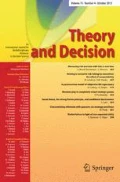Abstract
The American and some other constitutions entrench property rights by requiring super majoritarian voting as a condition for amending or revoking their own provisions. Following Buchanan and Tullock [The Calculus of Consent, Logical Foundations of Constitutional Democracy (University of Michigan Press, Ann Arbor), 1962], this paper analyzes individuals' interests behind a veil of ignorance, and shows that under some standard assumptions, a (simple) majoritarian rule should be adopted. This result changes if one assumes that preferences are consistent with the behavioral phenomenon known as the “endowment effect.” It then follows that (at least some) property rights are best defended by super majoritarian protection. The paper then shows that its theoretical results are consistent with a number of doctrines underlying American Constitutional Law.
Similar content being viewed by others
REFERENCES
Arlen, J.,M. Spitzer and E. Talley:2002,'Endowment effects within cor porate agency relationships ',Journal of Legal Studies 31,pp.1–38.
Atkinson, A.B.:1983,The Economics of Inequality,2nd edn (Clarendon Press, Oxford).
Bateman, I.,A. Munro, B. Rhodes, C. Starmer and R. Sugden:1997,'A test of the theory of reference-dependent preferences ',Quarterly Journal of Economics 112,pp.479–505.
Berle, A.A.and G.C. Means :1932,The Modern Corporation and Private Property (Macmillan, New York).
Black, C.:1999,A New Birth of Freedom (Yale University Press, New Haven,CT).
Buchanan, J.M.and G. Tullock:1962,The Calculus of Consent,Logical Foundations of Constitutional Democracy (University of Michigan Press, Ann Arbor).
Cooter,R.:2000,The Strategic Constitution (Princeton University Press, Princeton).
Goldsmith, R.W.:1985,Comparative National Balance Sheets (University of Chicago Press, Chicago).
Harsanyi, J.C.:1953,'Cardinal utility in welfare economics and in the theory of risk-taking ',Journal of Political Economy 61,pp.434–435.
Horwitz, M.:1992,The Transformation of American Law 1870-1960:The Crisis of Orthodoxy (Oxford University Press, New York).
Kahneman, D.,J. Knetsch and R. Thaler:1993,'The endowment e.ect,loss aversion and status quo bias, 'Economic Perspective, 5,pp.193–206
Kahneman, D.and A.Tversky:1979.'Prospect theory:An analysis of decision under risk, 'Econometrica 47,pp.263–291
Knetsch, J.L.and J.A. Sinden:1984,'Willingness to pay and compensation demanded:Experimental evidence of an unexpected disparity in measures of value, 'Quarterly Journal of Economics 99,pp.507–521.
Knez, P.,V. Smith and A. Williams:1985,'Individual rationality,market rationality and value estimation ',American Economic Review 75,pp. 397–402.
McClelland, G.and W. Schulze:1991,'The disparity between willingness to pay versus willingness to accept as a framing effect ',in D. Brown and K. Smith (eds.),Frontiers of Mathematical Psychology:Essays in Honor of Clyde Coombs 166–192.
Olson, M.:1971,The Logic of Collective Action (Harvard University Press, Cambridge,MA).
O 'Neal, H.and R.Thompson:2000,Close Corporations (West Group, St. Paul,MN).
Posner, R.A.:1998,Economic Analysis of Law,5th edn (Aspen Law & Business, New York)
J. Elster and R. Slagstand (eds.),Constituionalism and Democracy (Cambridge University Press, Cambridge),p.59.
Rawls, J.:1971,A Theory of Justice (Harvard University Press, Cambridge, MA).
Rubin, P.:1977,'Why is the common law effcient?' Journal of Legal Studies, 6, pp.51–63
Singh, H.:1991,'The disparity between willingness to pay and compensa-tion demanded:Another look at laboratory evidence ',Economic Letters 35,pp.263–266.
Stigler, G.:1971,'The theory of economic regulation ',Bell Journal of Economics and Management Science 3,pp.3–21.
Strauss, D.:2001,'The irrelevance of constitutional amendments ',Harvard Law Review 114,pp.1457–1505.
Sunstein, C.:1993,The Partial Constitution (Harvard University Press, Cambridge,MA).
Thaler, R.:1980,'Toward a positive theory of consumer choice ',Journal of Economic Behavior and Organization 1,pp.39–60.
Tullock, G.:1988,'The calculus postscript after 25 years ',in J. Gwartney and R. Wagner (eds.),Public Choice and Constitutional Economics (JAI Press, Greenwich,CT),p.139.
Tushnet, M.:1984,'An essay on rights ',Texas Law Review 62,pp.1363–1403.
Tversky, A.and D. Kahneman:1991,'Loss aversion in riskless choice:A reference-dependent model ',Quarterly Journal of Economics 106,pp. 1039–1061.
Tversky, A.and D. Kahneman:1992,'Advances in prospect theory: Cumulative representation of uncertainty ',Journal of Risk and Uncertainty 5,pp.297–323.
Rights and permissions
About this article
Cite this article
Procaccia, U., Segal, U. Super Majoritarianism and the Endowment Effect. Theory and Decision 55, 181–207 (2003). https://doi.org/10.1023/B:THEO.0000044625.73220.62
Issue Date:
DOI: https://doi.org/10.1023/B:THEO.0000044625.73220.62




